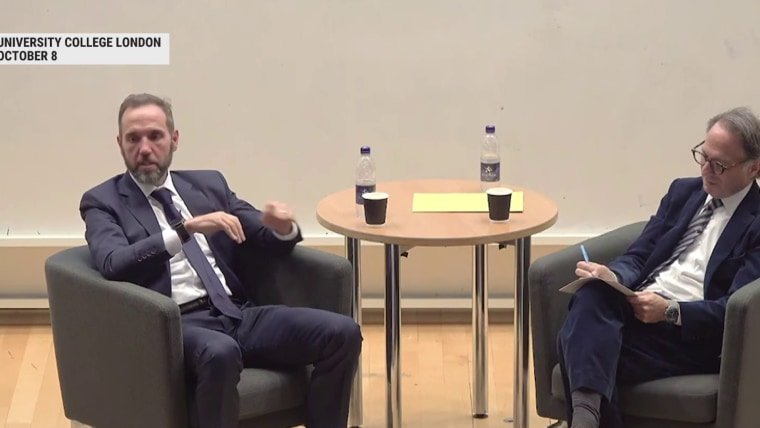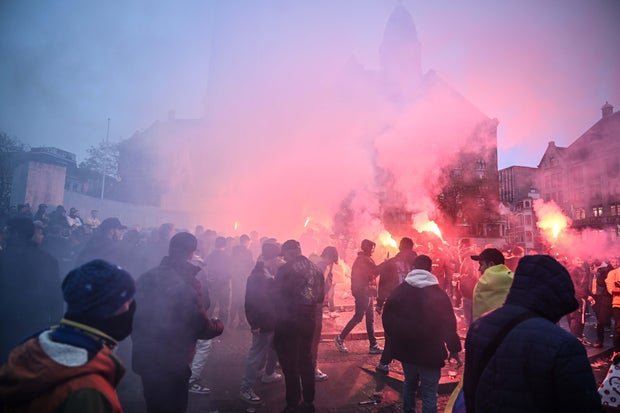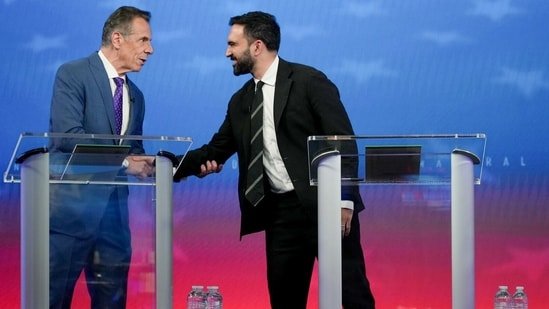US President Donald Trump claimed on Wednesday that Prime Minister Narendra Modi has assured him India will stop purchasing Russian oil, but India denied any conversation occurred on Wednesday when Trump said the discussion took place.

“He’s assured me, there will be no oil purchase from Russia. I don’t know. Maybe that’s a breaking story,” Trump said at the White House, where he spoke highly of Modi, describing the Indian PM as “a great man” and “my friend”.
“That’s a significant step. Now we’re going to encourage China to do the same thing,” he added.
External affairs ministry spokesperson Randhir Jaiswal said the leaders had last spoken on October 9, not Wednesday. “On the question of whether there was a conversation or a telephone call between Prime Minister Modi and President Trump, I am not aware of any conversation yesterday [Wednesday] between the two leaders,” Jaiswal told a media briefing on Thursday.
Trump acknowledged that ending Russian oil purchases would take time. “You know, you can’t do it immediately. It’s a little bit of a process, but the process is going to be over with soon,” he said, adding: “Within a short period of time, they will not be buying oil from Russia, and they’ll go back to Russia after the war is open.”
Russian oil purchases have become central to both Trump’s Ukraine peace strategy and the trade tensions between Washington and New Delhi. The US has imposed a 50% tariff on Indian goods—including a 25% penalty specifically for Russian energy purchases—arguing that such transactions fund Moscow’s war machine.
Trump added in his latest comments that he could get Russia and Ukraine to settle soon. “If India doesn’t buy oil, makes it much easier.”
Jaiswal emphasised that India’s energy purchases are guided solely by the objective of safeguarding “the interests of the Indian consumer in a volatile energy scenario.”
Jaiswal added that India was in discussions to deepen energy cooperation with America, including through greater purchases of US energy. HT earlier reported that US Energy Secretary Chris Wright is planning to visit India at the end of this year to drive discussions on energy cooperation forward.
India has maintained throughout that its energy purchases are driven by market forces and national security requirements rather than geopolitical alignment, consistently defending its right to secure affordable energy for its population.
Oil prices were stable on Thursday, after initially rising after Trump’s comments. Brent crude futures were down 28 cents, or 0.45%, to $61.63 a barrel at 4.40pm GMT. The Russian rouble weakened sharply against the US dollar and China’s yuan on market concerns about the country’s future revenues from oil exports.
According to trade data from analytics firm Kpler, reported by PTI, India’s crude imports in September were around 4.7 million barrels per day with Russian crude maintaining its position as India’s largest single source, contributing about 1.6 million bpd—a 34% share. However, this was roughly 160,000 bpd below the average Russian volumes imported during the first eight months of 2025.
Indian imports of Russian crude are tracking at a strong 1.8 million bpd in October, up approximately 250,000 bpd from September, Kpler data showed.
News agency Bloomberg reported on Thursday that India’s state-owned refiners, which account for more than 80% of the country’s oil-processing capacity, expect to reduce — not stop — the purchase of Russian crude but are awaiting clarification on the situation from the government in New Delhi.
Executives at four companies told the news agency that their initial analysis was that they expected a decline. All said they were caught off guard by the remarks, as did officials at three other firms who offered no view on whether buying would be curtailed.
Only one of these officials was on record. Mangalore Refinery and Petrochemicals Ltd Managing Director Mundkur Shyamprasad Kamath told an analyst conference call on Thursday that he was “confident” his company would continue buying Russian oil. “We are not trying to slow down or anything,” he said when asked how he sees US push to stop Russian oil buying. “For us it is business as usual, with respect to sourcing. We are sourcing those Russian barrels that is available today.”
Trump’s claims came as Indian officials led by commerce secretary Rajesh Agrawal are in Washington for trade talks. Before departing for Washington on Wednesday, Agrawal said India is willing to raise energy imports from the US, noting that energy imports from America had fallen from $25 billion to around $12-13 billion over the past 7-8 years.
“This headroom of around $12-13 billion could be leveraged quickly without worrying about configuration of Indian refineries,” Agrawal said. Refineries need to be technically configured to process any new type of crude oil, though Agrawal suggested this would not be a constraint.
He emphasised, however, that energy deals would depend on commercial viability. New Delhi is willing to raise US energy imports to address Washington’s concerns about the merchandise trade deficit with India, which stood at about $46 billion in 2024-25.
The US president’s remarks regarding India come after US ambassador to India Sergio Gor visited New Delhi and met with PM Modi, external affairs minister S Jaishankar and National Security Adviser Ajit Doval.
China separately rejected Trump’s pressure on Thursday, with Foreign Ministry spokesman Lin Jian defending Beijing’s “normal, legitimate economic, trade, and energy cooperation with countries around the world, including Russia.”
“The actions of the United States are a typical example of unilateral bullying and economic coercion,” Lin said, warning that if China’s interests are harmed, it will “take firm countermeasures and resolutely safeguard its sovereignty.”







